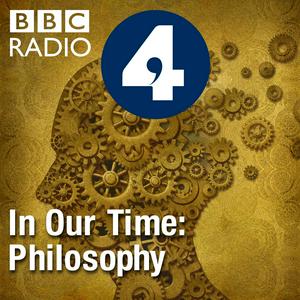Socrates in Prison
Melvyn Bragg and guests discuss Plato's Crito and Phaedo, his accounts of the last days of Socrates in prison in 399 BC as he waited to be executed by drinking hemlock. Both works show Socrates preparing to die in the way he had lived: doing philosophy. In the Crito, Plato shows Socrates arguing that he is duty bound not to escape from prison even though a bribe would open the door, while in the Phaedo his argument is for the immortality of the soul which, at the point of death, might leave uncorrupted from the 'prison' of his body, the one escape that truly mattered to Socrates. His example in his last days has proved an inspiration to thinkers over the centuries and in no small way has helped ensure the strength of his reputation.WithAngie Hobbs
Professor of the Public Understanding of Philosophy at the University of SheffieldFiona Leigh
Associate Professor in the Department of Philosophy at University College LondonAnd James Warren
Professor of Ancient Philosophy at the University of Cambridge and Fellow of Corpus Christi College, CambridgeProducer: Simon TillotsonReading list:David Ebrey, Plato’s Phaedo: Forms, Death and the Philosophical Life (Cambridge University Press, 2023)Dorothea Frede, ‘The Final Proof of the Immortality of the Soul in Plato’s Phaedo 102a-107a’ (Phronesis 23, 1978)W. K. C. Guthrie, A History of Greek Philosophy, vol. 4, Plato: The Man and his Dialogues, Earlier Period (Cambridge University Press, 2008)
Verity Harte, ‘Conflicting Values in Plato’s Crito’ (Archiv. für Geschichte der Philosophie 81, 1999)Angie Hobbs, Why Plato Matters Now (Bloomsbury, forthcoming 2025), especially chapter 5 Rachana Kamtekar (ed.), Plato’s Euthyphro, Apology and Crito: Critical Essays (Rowman and Littlefield, 2004)Richard Kraut, Socrates and the State (Princeton University Press, 1984)Melissa Lane, ‘Argument and Agreement in Plato’s Crito’ (History of Political Thought 19, 1998) Plato (trans. Chris Emlyn-Jones and William Preddy), Euthyphro, Apology, Crito, Phaedo and Phaedrus (Loeb Classical Library, Harvard University Press, 2017)Plato (trans. G. M. A. Grube and John Cooper), The Trial and Death of Socrates: Euthyphro Apology, Crito, Phaedo (Hackett, 2001) Plato (trans. Christopher Rowe), The Last Days of Socrates: Euthyphro, Apology, Crito, Phaedo (Penguin, 2010)Donald R. Robinson (ed.), The Cambridge Companion to Socrates (Cambridge University Press, 2011)David Sedley and Alex Long (eds.), Plato: Meno and Phaedo (Cambridge University Press, 2010)James Warren, ‘Forms of Agreement in Plato’s Crito’ (Proceedings of the Aristotelian Society, Volume 123, Issue 1, April 2023)Robin Waterfield, Why Socrates Died: Dispelling the Myths (Faber and Faber, 2010)In Our Time is a BBC Studios Audio Production
